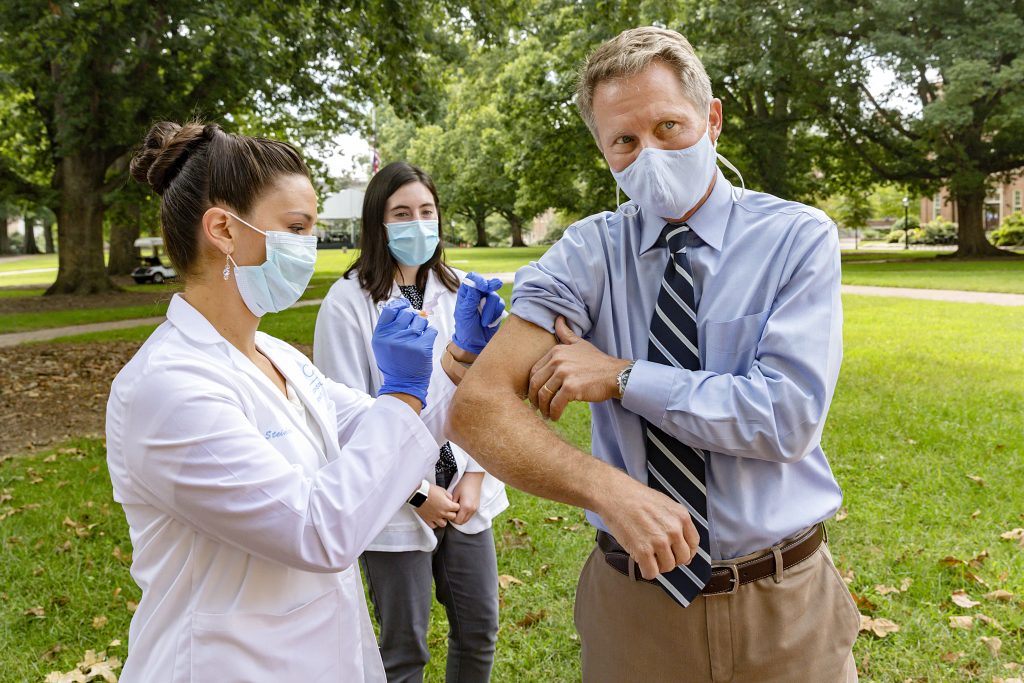November 16, 2020

More than 140 of our pharmacy students will graduate and enter the workforce next spring – possibly aligning with the release of novel coronavirus vaccinations.
The UNC Eshelman School of Pharmacy, along with School alumni in the field, are taking steps now to prepare for the possibility of vaccinating the general public, including certifying students to administer the vaccine, and identifying logistic solutions to store and deliver the therapy.
“As the world awaits a novel coronavirus vaccine for distribution, UNC Eshelman School of Pharmacy faculty, preceptors, students and alumni are engaged, prepared and trained to help our communities overcome the world’s most pressing health issue. Pharmacists are the most accessible health care professionals, as anyone can easily visit with one in their community. We stand at the ready to help put an end to this pandemic,” said Angela Kashuba, dean of the UNC Eshelman School of Pharmacy.
Readying students
Each fall, first year pharmacy students complete didactic and skills training for vaccinations to become certified student immunizers – despite the pandemic, it was important that this year be no different.
“Although this is a standard program offered throughout the country, we did insert and include relevant information as it relates to the development of a COVID-19 vaccine and how a program would be operationalized once it is available,” said Dennis Williams, Pharm.D., associate professor in the School’s Division of Pharmacotherapy and Experimental Therapeutics.
Second-through-fourth-year students who were already certified immunizers, are engaging in vaccinating patients in practice and clinic settings across North Carolina for this year’s flu season.
“Student pharmacists on advanced practice experiences in their fourth year are also involved in educating the public about safe practices during the pandemic,” Williams said. “In addition, depending on the practice site, students are getting exposure and experiences in testing for COVID-19 infection.”
Alumni thinks logistics, delivery
UNC Eshelman School of Pharmacy alumni Richard J. Whitesell, R.Ph., MBA, chief operating officer of Medipack Pharmacy in Winston-Salem, N.C., said he has been actively participating in the administration’s Operation Warp Speed conference calls with the America Society of Consultant Pharmacists.
“We are working diligently with the Centers for Disease Control to assure that our long-term care pharmacies and our clinical pharmacists are directly involved with the COVID-19 vaccination process for the residents we serve in our long-term care facilities,” Whitesell said.
Whitesell said there are four key components of vaccine preparation/administration that pharmacists and student pharmacists will be keeping in mind:
- We are in a pandemic (continue to follow communicable infectious disease best practices)
- Pharmaceutical manufacturers are developing new vaccines which are in Phase 3 trials and may receive Emergency Use Authorization from the Food and Drug Administration by late 2020
- Each vaccine has its own physical and chemical properties, dosage requirements, stability, and storage needs
- Vaccines must be distributed to the masses based on greatest need and logistics
“As health care professionals, who could have imagined we would ever be going through something like this? But pharmacists are by far best positioned to manage this allocation and administration process at all levels,” Whitesell said.
Whitesell added he and his team are focused on logistical hurdles that must be overcome, including safely storing vaccinations at required temperatures, identifying storage capabilities, understanding stability of vaccines, and dosing requirements.
“This project requires the operations/dispensing/logistics and clinical expertise of pharmacists,” Whitesell said. “This is where pharmacies and pharmacists are best positioned for this allocation project.”
The National Academies of Sciences, Engineering, and Medicine recently released the “Framework for the Equitable Allocation of COVID-19 Vaccine (2020)” that Whitesell said pharmacists and student pharmacists are familiarizing themselves with as part of COVID-19 vaccination preparations.
Preparing North Carolina pharmacies, pharmacy students
UNC Eshelman School alumni Patrick Brown, Pharm.D., executive director of North Carolina’s Mutual CPESN, and assistant professor of clinical education in the School’s Division of Practice Advancement and Clinical Education, said pharmacies in North Carolina will have several pathways to choose from when considering the logistics of obtaining, storing and administering the COVID-19 vaccine.
Brown said those include partnering with the North Carolina Department of Public Health, aligning with the recently announced federal pharmacy partners, such as CPESN USA, or a combination of the two.
“Right now, the most important thing for pharmacies to decide now is how they are going to enroll to receive the vaccine – state, federal or both,” Brown said. “For student pharmacists, they can be helping to educate family, friends and community members that the vaccines approved will be safe and effective and remind people to be patient. News is going to break that a vaccine has been approved, but there will be quite a bit of lead time before you can walk into your pharmacy and get a vaccine.”
Brown said he also anticipates students helping independent community pharmacies and retail pharmacies implement vaccine programs by engaging directly with patients, and by supporting workflows and safety protocols.
“We are preparing ourselves, pharmacists and student pharmacists, to be key administers of this vaccine,” Brown said. “Pharmacists are the most accessible healthcare professionals in our system and are often rated one of the most trusted. We have a huge opportunity in front of us, and we will be up to the task.”
Latest News

RASP poster presentations capture student research

Delesha Carpenter promoted to full professor


